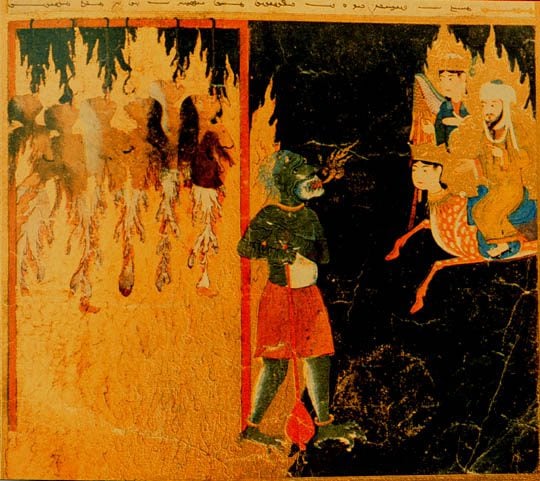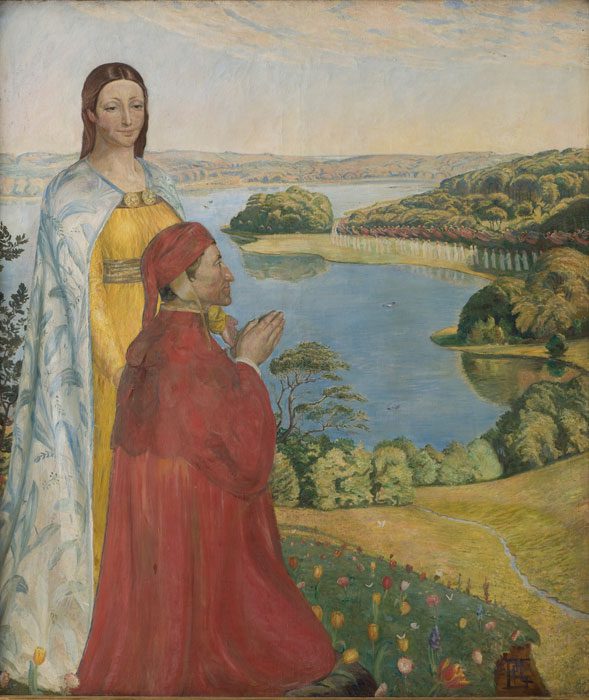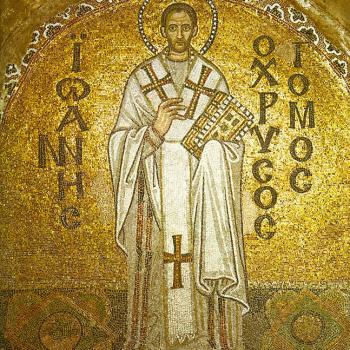
(15th cent Persian ms. Wikimedia CC public domain)
The ultimate destination of the damned is described in the Qur’an with highly picturesque language. Hell is a place of raging and roaring fire, of towering columns of destroying flame, and of scorching winds that drive pitch-black smoke across a blighted landscape. The souls of the unrighteous are prevented from escaping by fetters (hammered out of the very wealth that they lusted after on earth) that bind them to their place of punishment. Still subject to hunger and thirst, they are offered only food that chokes—including a horrific fruit that is said to look like devils’ heads—and a drink as hot as molten brass. “Yet you shall drink it as the thirsty camel drinks.”[1] The unrighteous rich are singled out for special mention.
Proclaim a woeful punishment to those that hoard up gold and silver and do not spend it in God’s cause. The day will surely come when their treasures shall be heated in the fire of Hell, and their foreheads, sides, and backs branded with them. Their tormentors will say to them: “These are the riches which you hoarded. Taste then the punishment which is your due.”[2]
However, it is not only the miserly who have reason to fear. None of the unrighteous will have an easy or pleasant time in the Qur’anic hell. The situation of the sinful soul will be desperate there, yet will have no hope. Of the sinner, the Qur’an says that “death comes upon him from every side, yet he cannot die.”[3] (One thinks of the inscription over the gate of hell in Dante’s Inferno, written in early fourteenth-century Italy: “Abandon all hope, ye who enter here.”)[4] “Those that deny Our revelations We will burn in Hell-fire,” God is quoted as saying. “No sooner will their skins be consumed than We shall give them other skins, so that they may truly taste Our scourge.”[5]

Even more detailed than the Qur’an’s portrayal of hell is its depiction of paradise. It is a picture that has inspired much derision among Westerners—most of it quite ignorant and beside the point.
The Qur’anic paradise is a garden, a place of darkest green, filled with palms and pomegranates and running streams. A shady region “as vast as heaven and earth,” it suffers from neither scorching heat nor biting cold. It is a very different place from the hell sketched above.
The saved are radiant. They recline on couches, clothed in garments of fine green silk and rich brocade, with bracelets of silver and gold on their arms. Luscious fruit hangs in clusters above and about them, and beneath them rich carpets are spread. Their lofty mansions provide them a view of the sufferings of the damned in hell, far below them. No idle talk is heard in paradise, but rather reflections upon the goodness of God and upon their lives and the lives of the damned in mortality. Meanwhile, their attendants, young boys whose beauty resembles that of scattered pearls, scurry about with vessels of silver and gold and goblets of crystal, serving to the righteous pure drink from a paradisiacal fountain, a pure wine that neither intoxicates nor gives a hangover.[6]
No aspect of the Qur’anic paradise has brought more leering comment than the so-called houris.[7] According to the Qur’an, these are maidens of bashful glance, dark-eyed and full-breasted. Their beauty resembles that of rubies and corals. Untouched by men, pure, cloistered in the pavilions of paradise where they remain “chaste like hidden pearls” or like “the sheltered eggs of ostriches,” they await the arrival of the blessed to the mansions prepared for them.[8] Are they fully human? Where do they come from? Are they righteous, believing women from the earth? The Qur’an does not say. But one of the great gifts bestowed by paradise upon the righteous is that God will marry them to these dark-eyed houris.[9]
This element of the Qur’anic paradise has, as I say, received much mockery in the West, and such criticism has often put educated Muslims on the defensive. Today and almost since the rise of Islam, there have been claims that these very tangible and material blessings are meant metaphorically. The point, according to many defenders of the Qur’an, is to illustrate even to simple believers that paradise contains “whatever the souls desire, and the eyes delight in.”[10] The metaphor should not, they insist, be taken as literal fact. Moreover, all these material symbols of the joy awaiting the righteous fail to convey adequately what bliss is really there. “No mortal knows,” the Qur’an declares, “what bliss is in store for [the righteous] as a reward for their labours.”[11] The real blessing of paradise, say the nonliteralists, is the blessing next to which all the trees and streams and nonintoxicating wines and houris dwindle into insignificance. In that place “the righteous shall dwell in gardens where rivers flow, honourably seated in the presence of a Mighty King.”[12] Being in the presence of God himself is the crown of all paradisiacal blessings. But one cannot leave the Qur’an’s very literal-sounding and graphic description of paradise without noting that Syriac Christian writings of a few centuries earlier contain almost precisely identical elements.
[1] Representative passages concerning Hell include 3:180; 14:16-17; 18:29; 25:12;
37:62- 74; 38:55-59; 44:43-50; 56:41-56; 73:12-13; 104:4-9.
[2] 9:34 35.
[3] 14:17.
[4] Dante, Inferno, Canto III, line 9: Lasciate ogne speranza, voi ch’entrate.
[5] The Christian Dante assigns a similar punishment to thieves, at Canto XXIV, lines 97-105, of his Inferno. Compare the fate of the sowers of schism and discord–among whom Dante unfairly places Muhammad–at Canto XXVIII.
[6] Representative texts on the Qur’anic paradise include 2:25; 3:15, 133-36; 4:57; 13:35; 18:31; 19:62; 22:23; 29:58; 37:40-61; 43:70-73; 44:51-57; 52:17-28; 55:46-77; 56:15-38; 57:21; 76:5-6, 11-22; 77:41-44; 78:31-36; 83:22-28; 88:8-16; 98:7-8.
[7] The singular, houri, is pronounced something like “HOO-ree.”
[8] On them, see 2:25; 3:15; 4:57; 37:48-49; 38:52; 55:56, 58, 70, 72, 74; 56:22-23, 3538; 78:33.
[9] 2:25; 3:15; 4:57; 44:54; 52:20.
[10] 43:71.
[11] 32:17. Compare the similar claim made by the Apostle Paul at 1 Corinthians 2:9. Paul’s own words show up in later Islamic tradition as a statement made by the Prophet Muhammad.
[12] 54:54-55. Even here, the plain meaning of the Qur’anic text suggests the possibility of literally being in the presence of a God who has spatial location. Actually, though, the Qur’an contains verses that can easily be used against an anthropomorphic view of deity. For example, it says, “Nothing can be compared with Him.” (42:11.) The real question is how such verses are to be received.












